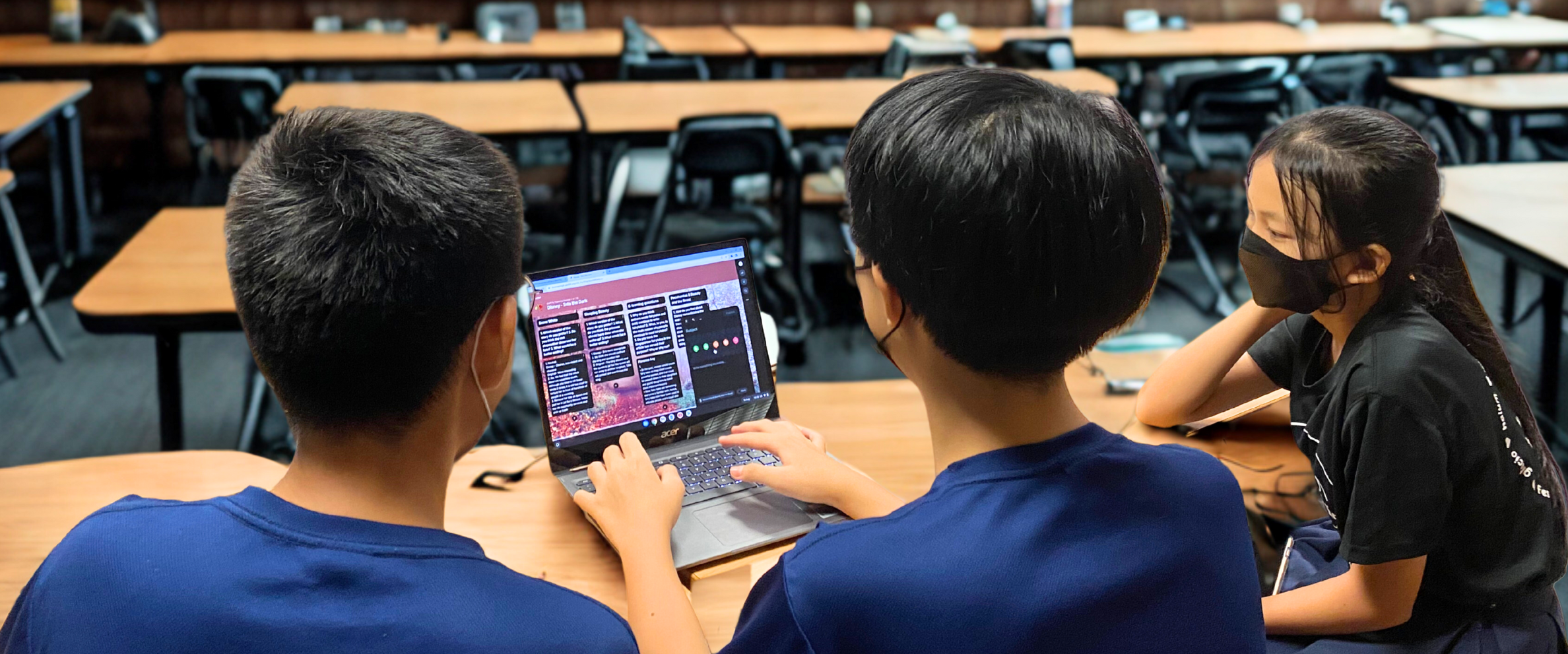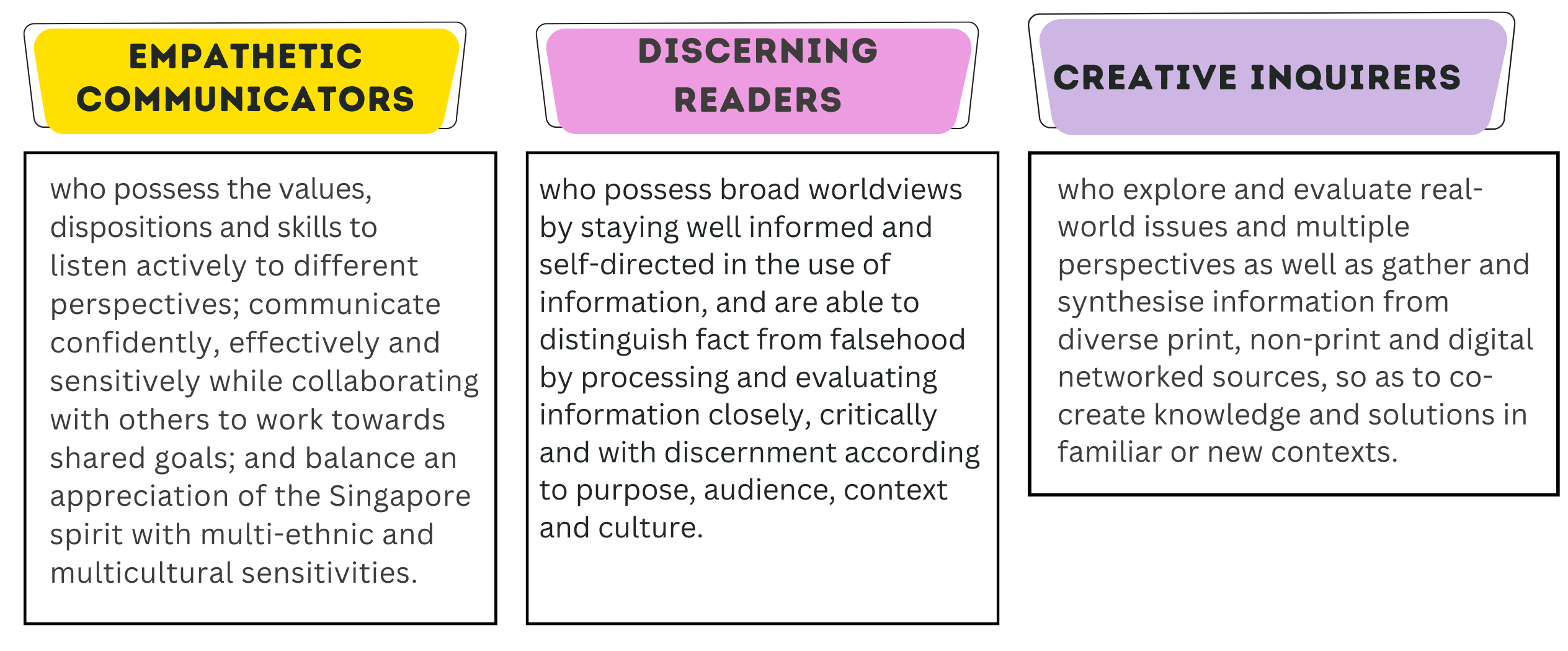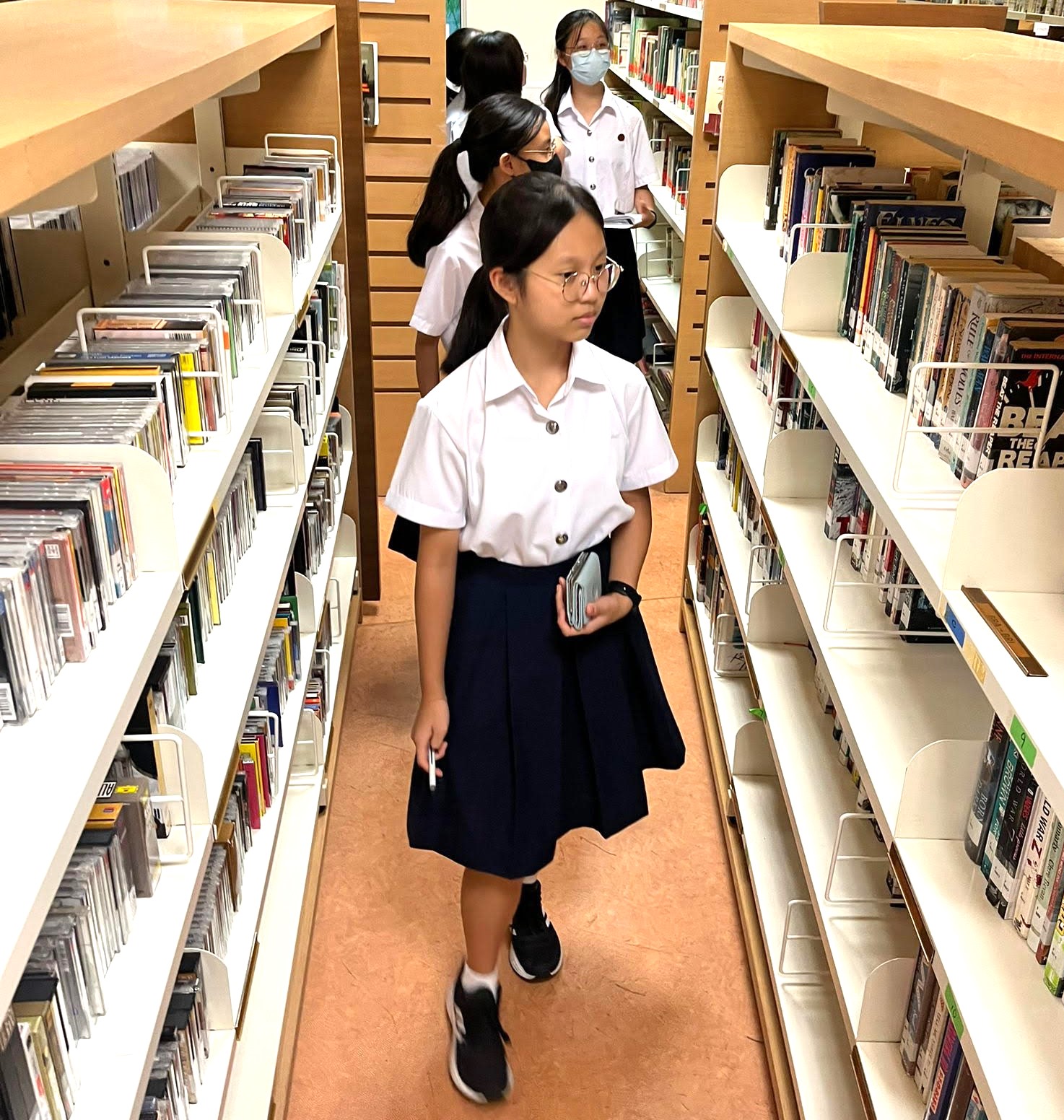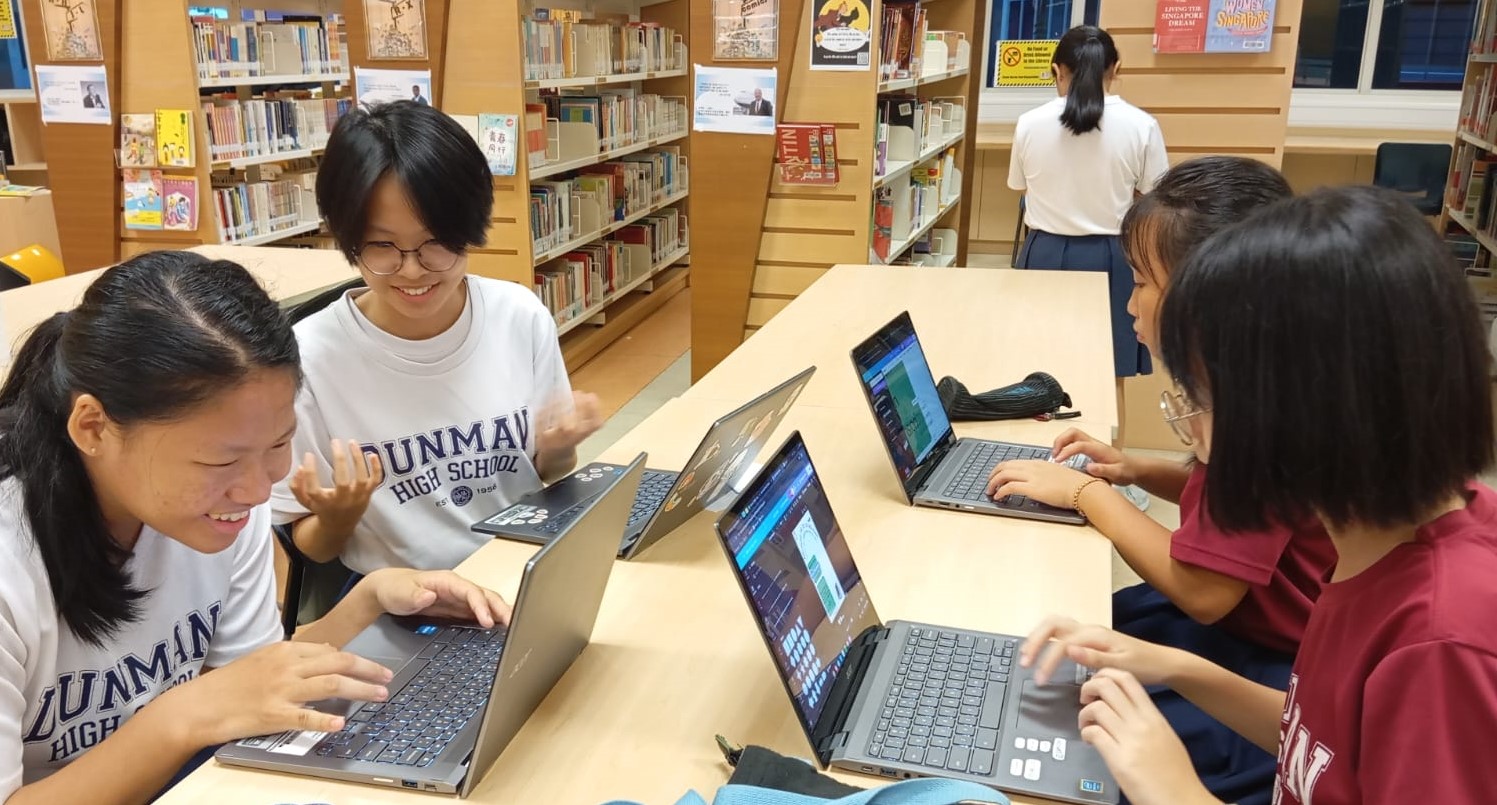English Programme
The English Language Department at Dunman High School is dedicated to nurturing students who are proficient and confident users of the English language.

Curriculum
Today, many changing socio-economic factors make proficiency in English and the development of 21st Century Competencies (21CC) even more necessary for our students. Globally, the increasingly competitive international environment calls for an even greater need for linguistic and communicative competence, adaptability and flexibility.
Our programme ensures that students experience a coherent and comprehensive language education that builds upon prior knowledge and skills. By emphasising critical thinking, cultural awareness, and effective communication, we prepare students to excel academically and thrive in an increasingly interconnected world.
Our comprehensive programme is designed to progressively develop critical and creative thinking alongside essential language and communication skills, ensuring students are well-prepared for the demands of the 21st Century while being immersed in a variety of learning experiences.
Content
Junior High English
Taking reference from the MOE EL Syllabus 2020, we seek to develop students as empathetic communicators, discerning readers, and creative inquirers.

At Dunman High School, our English programme is designed with these key competencies in mind. Through oral presentations, engaging discussions, Socratic seminars and analysis of multi-modal texts, we aim to equip our students with the emerging 21st Century competencies of Critical, Adaptive and Inventive Thinking, Communication, Collaboration and Information Skills and Civic, Global and Cross-Cultural Literacy.
Literature in English
Literature in English is offered to all students at the lower secondary level. The study of Literature raises awareness of the range of perspectives that human beings - separated by time, space and culture - are capable of developing. This increased awareness promotes empathy and global awareness. Students become cognisant of and reassess their own values, beliefs and biases through the study of poetry, prose and plays.
Aligned to MOE’s Literature in English syllabus, our department also strive to develop Dunmanians into Empathetic and Global Thinkers, Critical Readers, Creative Meaning-makers, and Convincing Communicators.

The habit of close reading promotes deep and heightened sensitivity towards
language, helping students to appreciate the nuances and layers of meaning
in texts around them. Students develop metacognitive habits of mind as
they constantly pay attention to the impact of language on thoughts and
feelings, and are sensitive to the places in a text that call for deeper
reflection and processing. Their minds are trained to acknowledge and consider
multiple perspectives, even as they learn to convince others of their interpretations.
At the same time, students develop a greater acceptance for ambiguity and
open-endedness.
In Years 3 and 4, students with a passion of Literature may opt to study it at a higher level as one of their Humanities subject. Literature at upper secondary aims to fosters students’ appreciation for the richness and diversity of literary texts. Through the exploration of themes, characters, and contexts, students develop empathy, cultural awareness, and a deeper understanding of the human condition. Deeper engagement with texts also cultivates critical and creative thinking, as students analyze a broader range of texts and articulate their interpretations effectively. These skills empower them to become thoughtful and articulate individuals who are prepared to navigate and contribute meaningfully to the world around them.
Senior High English
At the A-level, General Paper (GP), English Language and Linguistics (ELL), and Literature in English cultivate intellectual curiosity, ethical awareness, and expressive confidence – core to the Desired Outcomes of Education and 21CC.
GP develops critical thinking, ethical reasoning, and persuasive expression through engagement with global and societal issues. ELL deepens students’ understanding of language in real-world contexts, fostering precision in analysis and sensitivity to linguistic diversity and change. Literature nurtures empathy and insight through the exploration of human experiences and worldviews.
Together, these subjects prepare students to think critically, appreciate diverse perspectives, and navigate a complex world with clarity and confidence.
H1 General Paper (GP)
Our GP content comprises knowledge and skills in three integrated areas:
|
Area 1 |
Understanding of Issues of Local, Regional and Global Significance |
In GP, students discuss ideas and appreciate the interrelationship of issues. They relate new knowledge to prior knowledge and make connections. In the process, students develop conceptual understanding, which is transferable to other issues. |
|
Area 2 |
Critical and Inventive Thinking |
The skills related to this Area are:
|
|
Area 3 |
English Language for Effective Communication |
This Area requires students to understand and demonstrate the following skills:
|
H2 English Language and Linguistics (ELL)
The ELL curriculum consists of two Areas of Study:
|
Area of Study 1 |
Analysing Language Use |
|
Area of Study 2 |
Investigating Language Use in Society |
Through these areas of study, students will develop and deepen their understanding of language use and contemporary language issues. In their study of ELL, students will understand how language use is guided by a keen understanding of purpose, audience, context and culture.
H2 Literature in English
|
Paper 1 |
Reading Literature |
A compulsory paper providing broad exposure to literary study. Texts studied are of recognised literary importance and significance. |
|
Paper 3 |
Postcolonial Literature |
Focuses on Commonwealth literature responding to the Empire. This paper explores themes of nationhood, ethnicity, identity, pluralism, and transcultural experiences. |
H3 Literature in English
This option is designed for students with exceptional ability and passion for Literature. It encourages deeper specialisation and advanced literary study.
Delivery
Junior High English
In Dunman High, the teachers in the English Department infuse a variety of teaching pedagogies into the curriculum, allowing students to learn and acquire critical thinking skills through various platforms. In order to enhance our students’ ability to fluently and effectively in Standard English, we provide them with opportunities to understand how language changes according to purpose, audience, context and culture, and apply this knowledge in speech and writing in both formal and informal situations.
Guided by the EL Syllabus three foci of multiliteracies, metacognition and inquiry through dialogue, students engage with authentic texts, group discussions, close reading and analysis, presentations, and Socratic seminars to develop and enhance their receptive and productive language skills. Teachers also use Richard Paul’s Wheel of Reasoning to guide students in their thought process and reasoning in a logical manner. Through eight different elements of productive thinking, students learn to consider questions, issues and perspectives carefully and meaningfully. Students will practise making inferences, weighing evidence, recognising different points of views, and other forms of logical reasoning as they work through the given tasks. These learning experiences allow students to consider questions, issues and perspectives carefully and meaningfully.
At Upper Secondary levels, there is also an emphasis on civic and global awareness. Students are invited to explore complex ideas, analyse issues and problems, and uncover assumptions. In Socratic Seminars, students engage in a rigorous and thoughtful dialogue to gain a deeper understanding of complex ideas in different texts. These also encourage students to engage in meta-cognitive thinking and help them to develop a personal voice that is required for Senior High.
Literature in English
At Dunman High School, the study of Literature in English is an immersive and dynamic experience that nurtures critical thinking, creativity, and empathy. Through role play, students step into the shoes of literary characters, deepening their understanding of different perspectives and emotions. They are exposed to a diverse range of genres and texts, from local, Asian, canonic texts to poetry and drama, broadening their appreciation of storytelling across cultures and time periods. Exposure to film further enrich their learning, allowing them to analyze adaptations and visual storytelling techniques.
Research projects and creative assignments, such as scriptwriting, storytelling, set and diorama design and multimedia presentations, encourage students to engage deeply with texts and express their interpretations in innovative ways. By fostering a love for literature and honing analytical skills, our programme equips students with the ability to think critically, communicate effectively, and appreciate the power of language in shaping the world.
Senior High English

H1 General Paper (GP)
In DHS, we believe that GP is Life. The values, skills and dispositions that students develop in the course of studying GP are integral and closely intertwined with what they will need to progress and thrive in life.
The teaching and learning of GP in DHS is student-centred, systematic and organised. Through our lecture and tutorial system, students learn through explicit instruction of skills, suitable instructional scaffolds and regular practice with timely feedback. Students are also guided to monitor and regulate their own learning with the help of ICT tools.
The GP classroom is a space where knowledge is actively negotiated and co-constructed through purposeful dialogue with teachers and peers. Students also enhance their thinking through intentional collaborative learning experiences. They benefit from the exposure to various issues and different perspectives. Learning activities such as learning journeys and guest lectures add depth and diversity to their GP experience.
H2 English Language and Linguistics (ELL)
In the ELL classroom, students learn linguistic concepts and tools through explicit instruction, and apply these to analysis of texts. Appropriate instructional scaffolds are provided, such as modelling of text analysis and ‘live’ marking. ICT tools are strategically used to help students monitor, review and consolidate their learning.
Through collaborative learning experiences which include class discussions and peer feedback on tasks, students learn to communicate more effectively and develop a stronger awareness of social conventions and contexts. Learning journeys and inter-school ELL activities also enhance the ELL learning experience.
As the study of ELL involves analysing texts we encounter in our daily lives, students are involved in the curation of authentic texts so that their learning is situated in and relevant to real-world contexts. This aligns with our GP is Life philosophy, and students learn how our thoughts and actions shape and are shaped by our society and the world.
H2 Literature in English
Literature is more than the study of texts—it is the study of life. Through deep reflection, students confront human complexities, gaining empathy and fresh perspectives. They see how language shapes meaning, how stories define identities, and how diverse voices—including those from Singapore—offer windows and mirrors to the world.
Blending traditional and digital methods, we create spaces for inquiry, collaboration, and expression. Learning journeys, multimedia resources, and discussions immerse students in a process where they connect ideas, communicate effectively, and solve problems with insight. Literature and English nurture adaptable, reflective individuals—reinforcing our GP is Life philosophy, where words shape thought, and thought shapes the world.
In understanding stories, they find the courage to shape their own—and the world around them.
Assessment
Both formative and summative assessment play critical roles in providing learner-centred and balanced assessment. Assessment tasks as part of formative assessment are carried out regularly so that teachers are able to give students timely customised feedback and guidance that they could work on in order to improve.
In Dunman High, we employ a variety of methods to assess the skills of the students required for our subjects. These skills encompass reading, writing, speaking, listening and visual literacy. We also place an emphasis on multimodal texts to align with current trends and reading habits of the young today. A high premium is placed on crafting effective methods of assessment, as this is an important complement to a rigorous language curriculum. The observations made from assessing our students then enable our teachers to refine and adapt the pedagogy to better cater to our students’ learning needs.
At Junior High, process writing is used to allow students to become accustomed to good writing practices. Other formative assessment tasks include reflections and journals, role-plays, research projects and oral presentations, where students apply the language skills and content that they have learnt. Teachers also provide opportunities for students to work in groups to enhance their communication and collaboration skills, giving them a chance to produce and receive peer feedback, and reflect on their own work.
At Senior High, formative assessment is carried out regularly at different points in the term to assess students’ understanding and demonstration of skills in relation to set learning goals. Students are assessed on selected components in different ways. This assessment informs teaching and learning practices and helps to close the gaps between students’ current performance and their goals.
Summative assessment is conducted during the end-of-year examinations and at the A-levels. Summative assessment at the end of the year will focus on written skills, allowing students to demonstrate the skills that they have acquired over the year. The components tested include grammar editing, situational writing, essays, reading comprehension, analysis of visual texts, and personal responses to texts. These assessment modes will ensure that students are able to showcase their proficiency in various aspects of the English language, including clarity of expression, coherence in argumentation, and depth of analysis.
By incorporating a balanced mix of assessments, our approach ensures that students not only excel in written examinations but also gain confidence in articulating their ideas effectively, preparing them for future academic and real-world communication challenges.

